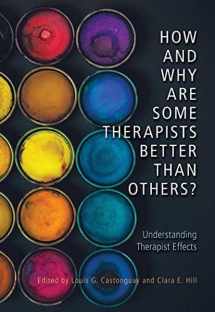
How and Why Are Some Therapists Better Than Others?: Understanding Therapist Effects
Book details
Summary
Description
Some therapists are more effective than others, that much is clear; why they are more effective is less clear. Editors Louis Castonguay and Clara Hill have gathered a panel of expert researchers and practitioners from diverse theoretical backgrounds to answer this complicated question. Synthesizing the rich literature on therapist effects in this comprehensive volume, they explore how various effects can help or hinder clients in therapy. They then propose practical strategies that mental health practitioners can use to improve their own effectiveness.
Castonguay, Hill, and their contributors first lay the empirical foundations for understanding therapist effects and why they are important. They also acknowledge the massive variability that exists among therapists and the complexities of studying therapist effects. Drawing from this fundamental knowledge, they then carefully examine specific therapist characteristics, attitudes, and skills that are relevant in any therapeutic setting. Topics include therapists’ responsiveness, presence, attachment, and technical interventions; cultural factors; negative emotions; humor; and creativity. Exciting new studies about therapist effects in the treatment of specific disorders, including depression and generalized anxiety, are also presented. The closing chapters translate the book’s general themes and takeaways into broader applications for research, intervention, training, and policy, including the role of routine outcome monitoring.


We would LOVE it if you could help us and other readers by reviewing the book
Book review



